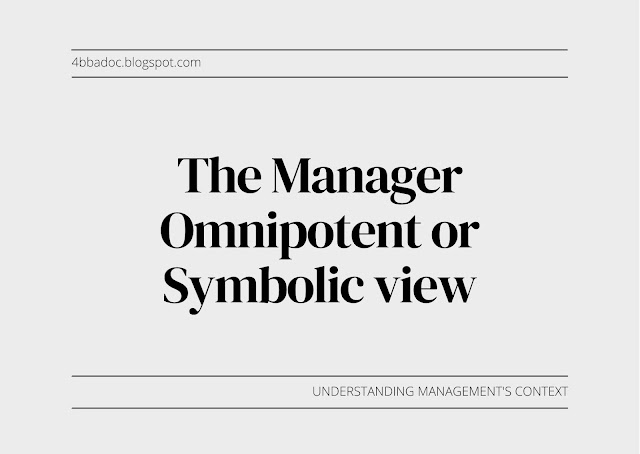Contrast the actions of
managers according to the
omnipotent and symbolic views?
- Omnipotent view of management:
The dominant view in management theory and society, in general, is that managers are directly
responsible for an organization’s success or failure. This perspective is called the Omnipotent view of management.
- Symbolic view of management:
In contrast, others have argued that much of an organization’s success or failure is due to external forces outside managers’ control. This perspective is called
the symbolic view of management.
Let’s look at each perspective to try and clarify just how much credit or blame managers should get for their organization’s performance
The Omnipotent View:
Differences
in an organization’s performance are assumed to be due to decisions and actions of
its managers. Good managers anticipate change, exploit opportunities, correct poor performance, and lead their organizations. When profits are up, managers take the credit
and are rewarded with bonuses, stock options, and the like. When profits are down, top
managers are often fired in the belief that “new blood” will bring improved results. Someone has to be held accountable when organizations perform poorly regardless
of the reasons, and that “someone” is the manager. Of course, when things go well, managers also get the credit—even if they had little to do with achieving positive
outcomes.
The Symbolic View:
The symbolic view says that a manager’s ability to affect performance outcomes is
influenced and constrained by external factors. According to this view, it’s unreasonable to
expect managers to significantly affect an organization’s performance. Instead, performance is influenced by factors over which managers have little control such as the economy,
customers, governmental policies, competitors’ actions, industry conditions, and decisions
made by previous managers.
This view is labeled “symbolic” because it’s based on the belief that managers symbolize control and influence. How do they do that? By developing plans, making decisions, and
engaging in other managerial activities to make sense out of random, confusing, and ambiguous situations. However, the actual part that managers play in organizational success or
failure is limited according to this view.
In reality, managers are neither all-powerful nor helpless. But their decisions and
actions are constrained.




Social Plugin